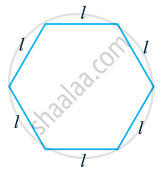Advertisements
Advertisements
प्रश्न
The sum of the multiplication table of natural number ‘n’ is given by 55 × n. Find the sum of table of 19.
उत्तर
Given, the sum of multiplication table of n natural numbers = 55 × n
Sum of table of 19 = 55 × 19 ......[Put n = 19]
= 1045
APPEARS IN
संबंधित प्रश्न
Observe the patterns of digits made from line segments of equal length. You will find such segmented digits on the display of electronic watches or calculators.

If the number of digits formed is taken to be n, the number of segments required to form n digits is given by the algebraic expression appearing on the right of each pattern.
How many segments are required to form 5, 10, 100 digits of the kind −

Write down the following in the product form: 6y5
Find a number which when multiplied by 5 is increased by 80.
The sum of three consecutive natural numbers is 114. Find the numbers.
If a number is tripled and the result is increased by 5, we get 50. Find the number.
The sum of two consecutive even numbers is 74. Find the numbers.
Deepak is twice as old as his brother Vikas. If the difference between their ages is 11 years, find their present ages.
Mrs. Goel is 27 years older than her daughter Rekha. After 8 years she will be twice as old as Rekha. Find their present ages.
A man is 4 times as old as his son. After 16 years he will be only twice as old as his son. Find their present ages.
A man is thrice as old as his son. Five years ago the man was four times as old as his son. Find their present ages.
The side of a regular hexagon is denoted by l. Express the perimeter of the hexagon using l.
(Hint: A regular hexagon has all its six sides equal in length.)

The side length of the top of square table is x. The expression for perimeter is ______.
The length of a side of square is given as 2x + 3. Which expression represents the perimeter of the square?
The speed of car is 55 km/hrs. The distance covered in y hours is ______.
The sum of first n natural numbers is given by `1/2n^2 + 1/2n`. Find the sum of first 11 natural numbers.
The sum of squares of first n natural numbers is given by `1/6n(n + 1)(2n + 1)` or `1/6(2n^3 + 3n^2 + n)`. Find the sum of squares of the first 10 natural numbers.
The sum of the multiplication table of natural number ‘n’ is given by 55 × n. Find the sum of table of 7.
If ![]() = 2x + 3,
= 2x + 3, ![]() = `3/2x + 7` and
= `3/2x + 7` and ![]() = x – 3 then find the value of:
= x – 3 then find the value of:
`1/2`![]() +
+ ![]() – 3
– 3![]()
